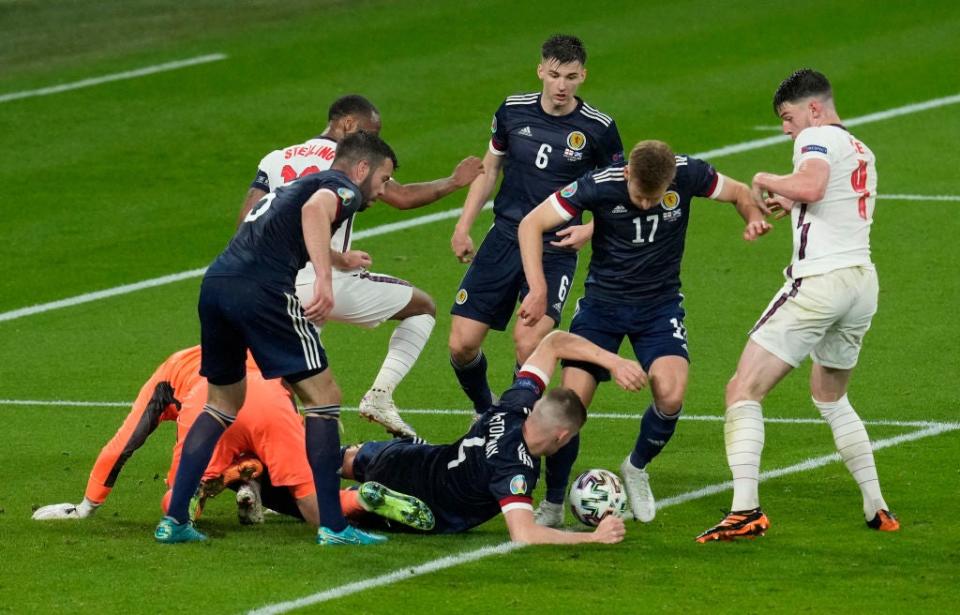Scotland revitalise Euro 2020 hopes with brave performances for the ages against England

In many ways it was typical Scotland. They came into this titanic Euro 2020 clash with England prepared to battle for a point - but, in the end, they came off the Wembley pitch wondering if they had missed an opportunity to claim all three.
If you had missed this latest encounter between international football’s oldest rivals, a 0-0 stalemate may suggest that Scotland had sat deep and held on with all their might against one of the favourites to win the tournament. But with their Euro 2020 hopes largely on the line, Steve Clarke’s side more than matched England and offered enough of a threat to turn an optimistic Wembley home support into an anxious hush.
Scotland’s journey under Clarke to their first major tournament in 23 years has been built on solidity and robustness. Rarely has the Scotland manager taken such risks with his side’s selection and approach, but across 90 tense, and often torrid minutes, at a sodden Wembley, Clarke offered a glimpse of a side who were prepared to put it all on the line in order to punch above their weight.
Earlier in the day, Scotland’s travelling fans arrived in London in their thousands. For the lucky few who had a ticket for Wembley, and for the unfortunate majority crammed into pubs and huddled around phones elsewhere in the capital, this was a performance to be proud of - but, perhaps, one that came a game too late.
If Clarke was accused of playing it safe for Scotland’s opening defeat to the Czech Republic on Monday, he belied his often dour and cautious demeanour by fielding a bold and adventurous side to match the Tartan Army’s ambitions here. He made four changes, lining up with two strikers as he recalled Che Adams, along with Callum McGregor and the returning Kieran Tierney - passed fit to start beside Andy Robertson.
But by far the bravest call from Clarke was handing Gilmour his first international start. Born in 2001, Scotland had not played a bigger game in Gilmour’s lifetime.
Given the occasion, the stage, and the opposition, the staggering nature of Gilmour’s first international assignment cannot be overstated - but it speaks to the character and quality of the 20-year-old’s displays early in his career that Clarke saw reason to place such a huge amount of faith on the young midfielder’s shoulders. He came off the field in the 76th minute with the sound of the Tartan Army singing his name ringing in his ears.
Regardless of his age, Gilmour was in Scotland’s team because of his ability. Despite his inexperience, he would offer Scotland something different. England were always going to have more of the ball at Wembley and Gilmour’s introduction was never going to change that, but his presence, specifically his zipped passes, balance on the ball and infectious self-assurance, allowed Scotland to have their moments in possession.
Scotland may have been left momentarily swinging after John Stones hit the post with a free header and Mason Mount prodded wide from inside the area, but Clarke’s men did not let the hosts build momentum. A succession of early fouls slowed England down and stifled their progress while their confidence on the ball grew as the half wore on, culminating in Jordan Pickford’s save from Stephen O’Donnell’s well-struck volley.
Gilmour’s inclusion may have been the headline one, but all of Clarke’s changes made an impact. Adams was often the spare man and caused England problems by dropping into space. The Southampton striker was Scotland’s free man and his performance was Clarke’s reward for his attacking gambit. His shot early in the match forced Stones into a key block after Gilmour and McGinn traded sharp passes and O’Donnell fired the ball across the box.
On the left, the return of Tierney and his combination with Robertson saw Scotland’s key strength fully restored. Another key adjustment was Scotland’s attitude, with and without the ball. Clarke’s men snapped into tackles with a vigour befitting a fixture of this magnitude, the work-rate of his players more than matched the difficulty of their task.

If Scotland’s first-half performance was one to be proud of, their second was one to offer genuine hope ahead of Tuesday’s meeting with Croatia. Lyndon Dykes thought a hooked volley from a corner was Scotland’s breakthrough, only for Reece James to head clear off the line, before Adams blazed a wonderful opening over the bar from the angle.
England withdrew captain Harry Kane, with the striker’s impact on the match completely minimal, and there can be no greater praise for Grant Hanley - back in from the international wilderness this season to shut out one of Europe’s best frontmen.
The blueprint for Scotland now is clear: to be bold and go again. Their final Group D fixture against Croatia on Tuesday was always going to be a must-win. It remains so, but even then it might not be enough.
But the void that was left by Patrik Schick’s outrageous goal from halfway, that threatened to dampen Scotland’s return to a major competition, has now been filled by something much bigger: belief. A passage through to the last-16 is now in sight.
Read More
Hungary vs France LIVE: Euro 2020 latest score, goals and updates from fixture today
Luke Shaw backs ‘best striker in the world’ Harry Kane to come good for England
Glasgow’s early night does not stop Scotland fans revelling in a famous day

 Yahoo Sport
Yahoo Sport 



































































